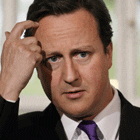19 Nov 2010 | News, United Kingdom

Facebook, Yahoo!, AOL (UK), Mumsnet and the Internet Service Providers’ Association (ISPA) have written an open letter to the Prime Minister David Cameron calling for urgent reform of our libel laws. Currently, forum providers and ISPs are being forced to act as judge and jury over the content of websites, blogs and online discussions. The effect is that libel threats are causing online content to be censored, even when the material is not actually defamatory. The internet companies are angered that the multiple publication rule which they are bound by, predates not only the invention of the internet, but that of the light bulb
(more…)
10 Nov 2010 | News
 David Cameron has extolled the virtues of human rights and democracy during his trade mission to Beijing but why won’t he raise the case of imprisoned writer Liu Xiaobo? Dinah Goodman reports
David Cameron has extolled the virtues of human rights and democracy during his trade mission to Beijing but why won’t he raise the case of imprisoned writer Liu Xiaobo? Dinah Goodman reports
(more…)
10 Nov 2010 | Asia and Pacific, China
 David Cameron has extolled the virtues of human rights and democracy during his trade mission to Beijing but why won’t he raise the case of imprisoned writer Liu Xiaobo? Dinah Goodman reports
David Cameron has extolled the virtues of human rights and democracy during his trade mission to Beijing but why won’t he raise the case of imprisoned writer Liu Xiaobo? Dinah Goodman reports

David Cameron’s first stop on his first visit to Beijing as Prime Minister was Tesco. As he was surveying the shelves of soy sauce and egg noodles, human rights activists were baying at his heels, urging him to make a public statement on human rights. Western leaders always get asked to do this of course when they meet China’s top leaders, but Cameron is under particular pressure in the wake of China’s snippy (almost hysterical) reaction to the award of this year’s Nobel Peace Prize to imprisoned intellectual Liu Xiaobo (read about that here). Cameron is the first western leader to visit Beijing since Liu’s controversial win.
Chinese human rights activists were not cutting Cameron any slack either. Dissident artist Ai Weiwei told the Today programme that Cameron would be committing a crime if he did not push the human rights issue with President Hu Jintao during his two-day trade mission here.
In the end, while Cameron did not publicly utter the L (Liu) word, he did give a speech where he lauded the benefits of democracy, an independent judiciary, and a free media, to students at Beijing University today. “All the time the government is subject to the rule of law,” he said. “These are constraints on the government and at times they can be frustrating. But ultimately we believe they make our government better and our country stronger.”
The lecture was not broadcast to the public and the human rights element is unlikely to be reported domestically. A quick search on baidu.com a few hours after the speech revealed only one Chinese news outlet, Hong Kong-based Phoenix TV, had reported on Cameron’s more controversial comments.
His phrasing was very diplomatic, perhaps in part because the last time he was here in 2007 he was reportedly called “arrogant” by a Chinese official for his public statements on China’s human rights record. At Beijing University today he was careful to say that he was not suggesting that the UK had “moral superiority” over China and that the UK was “not perfect”.
China has already warned western governments that they risk its wrath if they attend the award ceremony for Liu. “The choice before some European countries and others is clear and simple: do they want to be part of the political game to challenge China’s judicial system or do they want to develop a true friendly relationship with the Chinese government and people?” vice-foreign minister Cui Tiankai said last week. While no government is expected to bow to this threat — several countries, including the UK and France, have already confirmed they are attending — it’s a different matter when you are in Beijing to smooth the course of deals worth billions of pounds.
China has always been prickly about any public criticism of its peculiar brand of human rights and the stick it wields is money. Indeed a recent studyshowed the existence of the “Dalai Lama effect” where countries who meet with Tibet’s exiled spiritual leader lose an average of 8.1 per cent in exports to China in the two years after the meeting. A sobering thought for a man on a “vitally important trade mission.”
Dinah Gardner is a regional editor for Index on Censorship
13 Oct 2010 | Uncategorized
Andy Coulson must be scared. Not of the Guardian, which to date has failed to root him out of his job in Downing Street. And not of David Cameron, who shows no inclination to sack him. No, Coulson must be scared that his old boss Rupert Murdoch will pull the rug out from underneath him.
Murdoch wants, very much, to buy the whole of BSkyB so that he can move a big step closer to monopoly control of the British media market, and Coulson, almost accidentally, is getting in the way.
Any day now, Murdoch could pick up the phone in New York and ask Cameron (instruct him?) to ditch his most senior media adviser. No doubt News Corp would offer the former News of the World editor a nice job in compensation, but it would be the end of Coulson’s promising career as the smarter, slicker version of Alastair Campbell.
He is an embarrassment to the old man because the never-ending scandal of phone hacking keeps reminding us just how depraved and sinister the Murdoch empire can be. And this is happening at a moment when Murdoch wants us all to think of him as an inspiring business genius, a victim of Establishment snobbery and the man who just gives viewers what they want.
Murdoch employees illegally hacked the voicemails of the future king of this country, as well as dozens or more likely hundreds of other people very prominent in our public life. Reported targets include Cabinet ministers, a celebrity agent, a top sports official, a supermodel and at least one senior police officer — not to mention, perhaps most chillingly, ordinary members of the public who are victims of crime.
And as the revelations tumble out and the lawsuits against Murdoch’s company stack up, something even more significant is happening. People are talking more and more about his extraordinary power, and the fear he can spread.
That was the most potent message to come out of Peter Oborne’s Dispatches programme on the scandal last week. There were complaints afterwards that the key new witness casting doubt on Coulson’s I-knew-nothing defence was anonymous, but they missed the point: as Oborne made clear, the systematic need for anonymity provided eloquent proof of how frightened people are. Grassing on the Murdoch empire looks uncomfortably similar to grassing on the IRA.
Tom Watson MP, in a remarkable speech about phone-hacking to the Commons last month, sent the same message: “The barons of the media, with their red-topped assassins, are the biggest beasts in the modern jungle. They have no predators; they are untouchable. They laugh at the law; they sneer at parliament. They have the power to hurt us, and they do, with gusto and precision, with joy and criminality. Prime ministers quail before them, and that is how they like it.”
And have a look at the story of Michael Wolff, who had the nerve to write a critical biography of Murdoch. We probably wouldn’t have read that if it were not for phone-hacking.
Right now, when Murdoch has all his other ducks in a row for the total takeover of BSkyB — the Tories owe him for his papers’ election support; Ofcom is being neutered; the BBC is being kicked from pillar to post — he emphatically does not want to be making headlines as the monstrous bogey man of British public life.
So one day soon he may decide that Coulson, in principle a terrific Murdoch asset at the heart of British government, is in fact a liability. He may calculate that if Coulson went, the heat would go out of the phone-hacking scandal and those nasty headlines about ruthless, bully-boy News International would fade away.
And if that day comes, does anyone doubt that one phone call to Number 10 would settle the matter?


 David Cameron has extolled the virtues of human rights and democracy during his trade mission to Beijing but why won’t he raise the case of imprisoned writer Liu Xiaobo? Dinah Goodman reports
David Cameron has extolled the virtues of human rights and democracy during his trade mission to Beijing but why won’t he raise the case of imprisoned writer Liu Xiaobo? Dinah Goodman reports